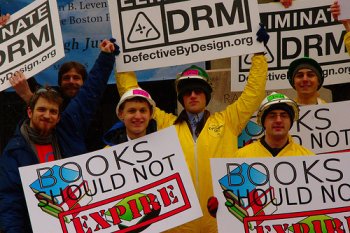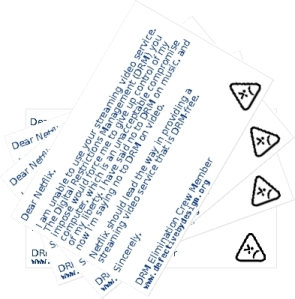Stop the RIAA from using the Department of Justice to do its dirty work
The RIAA is continuing to try coercion to prop up its illegitimate and unethical business model.
The RIAA is continuing to try coercion to prop up its illegitimate and unethical business model.
Electronic Arts (EA) and Amazon have been the targets of a justified online rebellion the last couple weeks. The impetus for the backlash is EA's use of Digital Restrictions Management (DRM) technology in its game Spore.

The Australian Broadcasting Corporation (ABC) is Australia's Federal Government-funded public broadcaster, and has responsibilities under the ABC Act 1983 to provide services to the Australian people.
In order for any program to be installed on the iPhone, the program must be cryptographically signed. When a user attempts to install software on her iPhone, the iPhone's Digital Restrictions Management (DRM) system checks to see if Apple considers the signature on the software to be valid.
If there is no signature or if the signature is invalid, the iPhone will refuse to install the software. If the software has been modified in any way, the signature check will fail. The signature check is also tied to the user's specific device, which means that she is not permitted to transfer or copy downloaded programs directly between iPhones, and any other copying is permitted or not permitted at Apple's whim. This system of rejecting software that doesn't pass a signature check -- even when modifications to the software are legally permitted -- was made famous by TiVo, and so is called "tivoization".

Yahoo! has announced that its music store will be going offline at the end of September, taking with it the authorization keys for any music purchased. This appears to be something of a trend lately, with Microsoft announcing similar plans, only to go back on its original plans a few days later.
As Ars Technica puts it, "The bad dream of DRM continues" -- "Once the Yahoo store goes down and the key servers go offline, existing tracks cannot be authorized to play on new computers."
Major League Baseball and Google Video have both pulled similar stunts, with Google at least providing a refund for the media, but no DRM-free replacement.
Yahoo's own Ben Patterson spoke to Michael Spiegelman, the senior director for Yahoo! Music, about keeping the DRM servers going, like MSN has promised to do...
"We can't really talk to the specific numbers [in terms of cost]," said Spiegelman, adding that Yahoo! uses a third-party service to host its DRM license keys. "To be honest, it's a question of whether we want to spend the money supporting DRM tracks, versus spending that money on what people really do want [subscription and/or DRM-free music]."
When asked about replacing any purchased, DRM'd Yahoo! Music tracks with the equivalent DRM free tracks from Rhapsody, Spiegelman replied "We'll take those situations in a case-by-case fashion... We will be able to help users out who have a large number of tracks... We're not saying that that would be an impossible option... We'll see how much of a demand there is for it."
Are you a Yahoo! Music customer? Contact Yahoo! Support and demand DRM-free replacements for all the songs you've legally purchased.
Update: Yahoo: We'll Reimburse Users for Terminated Music
CNET is reporting that customers will be offered refunds or DRM-free downloads, while Wired News is saying any DRM-free downloads could break any agreements Yahoo! has with record labels.
We have often described many reasons to avoid the iPhone.
Here is an opportunity to have some fun and get answers about the iPhone, straight from the horse's mouth, so to speak.
In every Apple retail store is a so-called "Genius Bar" -- a technical support station, the purpose of which is to offer help and support for Apple products.
You can use Apple's helpful online booking system (no registration required) to reserve time slots at the Genius Bar. There are currently 364 Apple stores in 13 countries, giving us plenty of slots to book. Several years ago, we held a two-day, worldwide iPhone Challenge, but you can keep up the pressure by continuing to visit your local Genius Bar and giving Apple the iPhone Challenge.
1) Book a 10-minute slot now!
Book online: USA, Australia, Belgium, Brazil, Canada, China, France, Germany, Hong Kong, Italy, Japan, Macau, Mexico, Netherlands, Singapore, Spain, Sweden, Switzerland, Taiwan, Turkey, the United Kingdom, United Arab Emirates.
2) Let us know which stores you have booked using our online counter.
3) Microblog about this, to encourage others to participate
At the Genius Bar....
Print out our handy questionnaire and information about how iPhone 3G restricts your freedom. If you have access to a color printer, you can also print out some of our snazzy iPhone flyers to hand out to people outside the store when you're done.
Head over to your local Apple Store at your designated time. Be sure to get a business card from your Genius first and then politely ask them the questions. For each question, give them a score between 1 and 32, with 1 being a really bad answer, and 32 being an answer that really showed insight into the restrictive practices of the iPhone.
The total score will be out of 160 -- the IQ level of Einstein, a certified genius. Rate your Genius's iQ to the same score, and if they get over 130, they're a genius -- any lower than that, and they're screwed. Glory and infamy awaits!
If you feel your Genius did particularly well, or particularly badly, please let us know their name, email address, and the store address -- it'll be on their business card. We'll send prizes and information accordingly.
Start by introducing yourself to your Genius.
"I'm from the DRM elimination crew at DefectiveByDesign.org -- I'd like to ask you a few questions about the defects Apple has designed into the iPhone 3G."
Why do all developers have to submit their applications to Apple before they can be loaded onto an iPhone?
Most smartphones, including those by OpenMoko, Nokia, RIM, Palm and even Microsoft, allow applications to come from a variety of sources, including free software developers. Free "as in freedom" software development requires that users and developers be able to share and modify the source code for programs they use. iPhone users are not permitted by Apple to share or load modified versions of programs distributed through the App Store -- even when a program's developer wants users to be able to do this! Apple markets itself as empowering, alternative technology -- How does Apple plan to support free software development?
Why does iTunes still contain so much DRM-laden music?
Services like Amazon, eMusic, Napster, Rhapsody, Play.com and 7digital are all selling music without DRM. A typical response to this might be that Apple has no option to sell media without DRM, but this is simply untrue. Jobs is the largest individual shareholder at Disney, and he could insist that its films be DRM-free. Apple should be leading the way to promote DRM-free music, but instead is lagging behind. What is Apple doing to fix this? If it really is the RIAA's fault, can you tell me specifically what the RIAA said to Jobs when he asked for the ability to sell DRM-free music?
The iPhone 3G has GPS support. How can users be sure that the GPS cannot be used to track their position, without their permission?
When the only thing preventing the GPS from being used is software, and the software in question is known only to Apple, why should iPhone users trust Apple? There is a privacy agreement, but how would I ever know that the agreement was violated?
In 'Thoughts on Music', Steve Jobs said, "it is useful to remember that all iPods play music that is free of any DRM and encoded in 'open' licensable formats such as MP3 and AAC".
If Jobs really wants to see open formats, why doesn't the iPhone play Ogg Vorbis, Ogg Theora video and FLAC? These formats require no licensing costs, and are not encumbered by patents. How does Apple plan to support these formats in the future? Will Apple approve applications for the App Store that support these formats?
Last question. Why can the iPhone 3G only be activated by Apple and AT&T?
In the United States, the Register of Copyrights has ruled that consumers have the right to unlock their phones and switch to a different carrier. How does Apple plan to remedy this discrepancy?
Give your Genius their score, your contact information (if you want) and your handout, along with any additional feedback you have about the defects in iPhone 3G. Thank them for their time, and quickly and politely leave the store. Outside the store, distribute some of the flyers and spend some time talking to people about these issues.
Let us know how it went by sending an email to info@defectivebydesign.org with your Genius's information, score, and your comments.
We've made two additions to the guide to DRM free living -- Rhapsody and Naxos. Rhapsody is now offering MP3 downloads of lots of popular music, including all the major labels.
From their website —
Experience DRM-Freedom: Rhapsody MP3s aren't restricted by DRM. If acronyms aren't your thing, that means; when you buy a song or album from Rhapsody you can do whatever you want with it. Put it on your iPod or any other MP3 player, play it on as many computers as you want, or burn it to a CD as many times as you want.
Naxos has also moved to MP3 -- making audiobooks available in the format, with a huge selection of contemporary and classic titles, Naxos is a great place to get audiobooks.
What does this tell us? Well for one, Audible and iTunes are yet again, deceiving users with their DRM-laden materials. It also shows that more and more people are saying no to Digital Restrictions Management and that existing services are having to adapt to meet those demands.

Bruce Schneier has brought a new form of Digital Restrictions Management to our attention:
Microsoft is doing some of the most creative thinking along these lines, with something it's calling "Digital Manners Policies." According to its patent application, DMP-enabled devices would accept broadcast "orders" limiting capabilities. Cellphones could be remotely set to vibrate mode in restaurants and concert halls, and be turned off on airplanes and in hospitals. Cameras could be prohibited from taking pictures in locker rooms and museums, and recording equipment could be disabled in theaters. Professors finally could prevent students from texting one another during class.
It sounds innocent enough, until Schneier pulls back the curtain to show the real motivation behind these policies:
Don't be fooled by the scare stories of wireless devices on airplanes and in hospitals, or visions of a world where no one is yammering loudly on their cellphones in posh restaurants. This is really about media companies wanting to exert their control further over your electronics. They not only want to prevent you from surreptitiously recording movies and concerts, they want your new television to enforce good "manners" on your computer, and not allow it to record any programs. They want your iPod to politely refuse to copy music a computer other than your own. They want to enforce their legislated definition of manners: to control what you do and when you do it, and to charge you repeatedly for the privilege whenever possible.
Consumers are objecting en masse to the idea of their own computers and devices continuously and indiscriminately policing their activities via Digital Restrictions Management. So it's no surprise that Microsoft is hatching plans to soft-pedal these same restrictions under the term "manners." This is just old wine in new bottles -- Microsoft wants another way to control your activities.
Since they would be the patent holder, they can profit from selling this ability to monitor and control you to others. There's no doubt that their main customers would be the same media distribution companies who are struggling to cripple the technology that makes them irrelevant -- technology that enables many more artists and creators to share their works directly with the public.
Microsoft's patent abstract says:
Similar to some of the social manners honored among people, such as with "no smoking" or "employees only" zones, "no swimming" or "no flash photography" areas, and scenarios for "please wash your hands" or "no talking out loud", devices may recognize and comply with analogous "device manners" policy.
It's common for companies pedaling digital restrictions to try to find parallels in the analog world, to make the restrictions seem familiar and correct. But these are flawed comparisons -- no machine covers your mouth with duct tape when you enter a "no smoking" zone just to make sure that you don't smoke. Nobody breaks your fingers to make sure that you don't use the flash on your camera in a museum.
Digital restrictions require you to hand over your privacy and freedom in advance. They are inherently unsafe because people other than the intended parties can access these mechanisms for monitoring and restricting you. They are inherently untrustworthy because you aren't legally allowed to know what's going on behind the scenes on the device in your pocket, including the contents of its continuous conversation with whichever corporation it's reporting to. The purpose of the restrictions might sound benign but their mechanism is unacceptable -- and what these companies are actually after is acceptance of the mechanism, so that they can then put it to other uses.
Digital Restrictions Management and "Digital Manners Policies" both use the fear that some people might not do the right thing to justify treating everyone like a criminal and taking away our freedom. We shouldn't accept this justification to cripple what are otherwise incredibly useful and powerful tools for innovation and creativity. "Digital Manners Policies" are really "Digital Monitoring Policies," and we should refuse them.

On Wednesday, Industry Minister Jim Prentice introduced a bill that BoingBoing's Cory Doctorow described as making it "flatly illegal to break any kind of digital lock, or to violate terms in one of those absurd end-user license agreements that make you promise to agree to let the record industry kick your teeth in and drink all your beer, just for the dubious privilege of paying for a song at iTunes or watching a video on Viacom's website.".
Doctorow also points out that "[t]his amounts to private law: under Prentice's plan, Parliament would get out of the business of making copyright law, simply enforcing whatever copyright law the entertainment industry itself dreamed up". Michael Geist, law professor at the University of Ottawa states, the education provisions "[t]urn librarians into locksmiths" by requiring that they expire their digital materials after no more than five days.
This is an extremely troubling case, as all signs point to this being far worse than the US's Digital Millennium Copyright Act (DMCA). Let's not forget that Adobe under the DMCA had a Russian programmer, Dmitry Sklyarov, arrested and imprisoned. His "crime"? Distributing a product designed to remove locks from ebooks so that they could be fully used like regular books.
Especially given that consumers are rejecting DRMed media and moving toward services like eMusic, Amazon MP3, Magnatune and Jamendo, this would be a terrible law to pass. Geist notes that "the DMCA provisions are worse than the U.S. and the consumer exceptions riddled with limitations" -- the provisions include a potential $20,000 per infringement damage award that could see Canadian citizens threatened with legal troubles for uploading a snippet of a song to any video-sharing site.
Canada's excuse is that it needs the DMCA in order to comply with the 1996 WIPO Copyright Treaty. But this is no reason at all -- We need to make it clear that an unjust treaty cannot justify a further unjust law!
We simply cannot let this pass.
The Canadian government needs to hear that this law is Defective by Design!
UPDATE: Canadian Colalition for Electronic Rights have a simple form for Canadian citizens to easily email Prentice and others
Photo credit: Heidi Wholeness at Flickr

Take action: Digg the invitation, attend the Zuneral.
Harvard Free Culture has entombed an iPod and a Zune in cement in preparation for a Zuneral, to commemorate the death of Digital Restrictions Management.

Microsoft is using DRM to prevent users from saving certain television shows to their hard drive. Saving such streams is a normal feature that comes with Windows Media Center, but they have locked you out of
Last night the DRM Elimination Crew attended the grand opening of Apple's new store in Boston -- now its largest US store.
The clear glass front of the store stands in stark contrast to Apple's unethical business practices, including using opaque Digital Restrictions Management software to take rights away from its customers.

Microsoft is ceasing support for its MSN Music service. After August 31, 2008, people who have bought music from the service will no longer be able to move that music to different computers, or even change the operating system on their current computers.
Over the past eighteen months, the music industry has almost universally turned its back on Digital Restrictions Management. Major distributors like Amazon.com are marketing their music as "DRM-free MP3 music downloads." and companies like emusic.com are continuing to
The Canadian Broadcasting Corporation (CBC) has some excellent news for DRM-free living.
The CBC will be the first major North American broadcaster to release one of its programs without Digital Restrictions Management (DRM). On top of that, they will be using BitTorrent to distribute the program, which is "Canada's Next Great Prime Minister".
Take action:

It's yet another example of what we just talked about -- DRM doesn't just restrict copying of music files, it infects your entire system and turns it against you. Apple is explicitly preventing DTrace from examining or recording data for processes which don't "permit" tracing -- processes like, say iTunes.
People are seeing Digital Restrictions Management for what it is this week, thanks to Apple's "Fairplay" DRM scheme.

When you buy into DRM technology, you put control over your computer in someone else's hands. This guarantees that unpredictable and unpleasant things will happen. Those with the DRM keys can decide that you no longer have the right to access the media you bought unless you agree to some new terms or buy some new tech, like Major League Baseball and Google Video have both done recently.


If you subscribe to Netflix, here's an easy way to let them know that you will not be using their DRM download service. All you need to do is...
Imagine a used car salesman putting up big signs advertising "unbroken cars." That's exactly what Wal-Mart, Amazon, and Microsoft are doing. Their marketing campaigns are based on the fact that their music is DRM-free. Wow, thanks, you've caught up to the gramophone. Not only are you going to sell me the music I'm paying for, but you aren't even going to wrap it up in technology that is defective by design.
It's taking a while, but maybe Warner Music is finally starting to get the hint. They didn't get it after Steve Jobs showed initial signs of comprehension, so we decided back in April that someone needed to initiate a